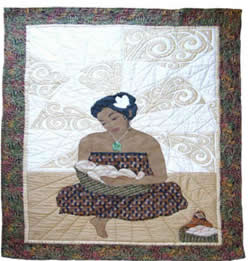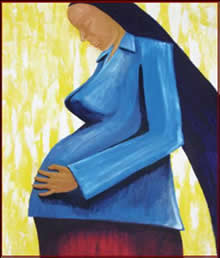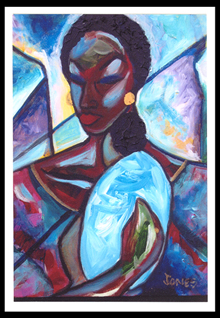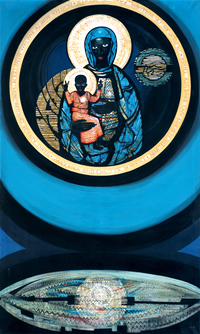"Lo, Faithful Virgin"
For Sunday December 15, 2013
Lectionary Readings (Revised Common Lectionary, Year A)
Isaiah 35:1–10
Psalm 146:5–10 or Luke 1:47–55
James 5:7–10
Matthew 11:2–11
When I was in Oxford several years ago, every evening I left my study carrel and walked down Woodstock Road to the city center and attended the Evensong services at Magdalen College. I loved so many things about those thirty minutes of worship — the peace and quiet, the architecture, the history (Magdalen College was founded in 1448), the smell of the candles that lit the early darkness of October, the boys choir in robes, and the formal liturgy.
 |
Applique Quilt, Maori Madonna and Child. |
One part of Evensong caught me off guard; every single night we sang Mary's "Magnificat" (Luke's Gospel for this week). Why did the daily liturgy assign her such prominence? Why was Mary so central to the daily Christian confession?
In the small Presbyterian church where I grew up, every Sunday we recited the Apostles Creed that Jesus was "born of the Virgin Mary." Practically speaking, Mary played no role at all in my Christian identity. Later I learned that Protestants question dogmas about Mary that were codified quite recently and that do not enjoy clear Biblical support, like her perpetual virginity, her freedom from actual and original sin (Immaculate Conception, 1854), and the idea that she did not die but was taken directly to heaven (Bodily Assumption, 1950).
We Protestants also get agitated about exalted language that sounds like Mary is a co-redeemer of humanity. And finally, in popular devotion the cult of Mary can drift into excess and superstition. For these reasons, Protestants emphasize a distinction that both Catholic and Orthodox believers acknowledge, that Christians honor or venerate (duleia) Mary as the Mother of God, but we don't worship her (latreia), which worship is due to God alone.
Nevertheless, you might argue that no woman has influenced western history and culture more than Mary. Her "Magnificat" in Luke 1:46–55 takes its name from the first word of the Latin text:
My soul glorifies the Lord
and my spirit rejoices in God my Savior,
for he has been mindful
of the humble state of his servant.
From now on all generations will call me blessed,
for the Mighty One has done great things for me—
holy is his name.
His mercy extends to those who fear him,
from generation to generation.
He has performed mighty deeds with his arm;
he has scattered those who are proud in their inmost thoughts.
He has brought down rulers from their thrones
but has lifted up the humble.
He has filled the hungry with good things
but has sent the rich away empty.
He has helped his servant Israel,
remembering to be merciful
to Abraham and his descendants forever,
even as he said to our fathers.
Despite Protestant reservations, Mary remains cenral to our Christian confession for four important reasons.
 |
Madonna with Child by Ron Garvais. |
Mary was a woman of exemplary faith. She was a peasant girl from a working class neighborhood of carpenters in Nazareth, a village so insignificant that it's not mentioned in the Old Testament, in the historian Josephus (c. 37–100), or in the Jewish Talmud. "Can anything good come from Nazareth?" asked Nathanael (John 1:46). Her angelic encounter took place in an unknown, ordinary house, not the temple. When the angel Gabriel foretold the birth of her son Jesus, Mary responded in words of faith that have echoed through the centuries: "I am the Lord's servant, may it be to me as you have said." Her bold belief startled her pregnant cousin Elizabeth, who exclaimed "in a loud voice: Blessed are you among women, and blessed is the child you will bear! Blessed is she who has believed that what the Lord has said to her will be accomplished!" (Luke 1:38, 42, 45).
Catholics remind us of another "Marian" truth that's easy to overlook but nevertheless stupendous. In some mysterious way the incarnation resulted not only from the work of God the Father but also from the will of the Mother Mary. Numerous church fathers acknowledged Mary's active cooperation in the history of salvation. According to Thomas Aquinas (Summa, III:30), human redemption depended upon the consent of the pregnant teenager Mary. She didn't ask to bear the Son of God, nor was she compelled to do so. She might have said no, or like Zechariah responded to Gabriel's staggering annunciation in disbelief. But she didn't shrink from God's call on her life, and instead enriched all humanity by her willing participation and obedient submission.
 |
Ronald Jones, Madonna and Child. |
Mary was also a woman of prophetic pronouncement. Her "Magnificat" moves from the deeply personal to the explicitly political. God, Mary proclaims, "has been mindful of the humble state of His servant… the Mighty One has done great things for me." This peasant girl who a few months later would bear the Son of God then praises God the Mighty One because He has "brought down rulers from their thrones but has lifted up the humble. He has filled the hungry with good things but has sent the rich away empty" (Luke 1:48–49, 52–53). I wonder what Herod or Tiberius thought when they heard her words. The incarnation of the Son of God, Mary announced, meant the inversion of conventional wisdom. Dethroning political power, plundering rich people, and redistributing food supplies signaled a new age and order.
Finally, Eastern Orthodox believers emphasize that because the son of Mary was the Son of God, God made flesh, we honor her with the technical term theotokos ("bearer of God"). In his poem The Annunciation John Donne thus marvels:
This term theotokos bestowed upon Mary by church fathers since the third century acknowledges her special role in redemption; she is nothing less than the "Mother of God." When the term gained official status at the third ecumenical council of Ephesus in 431, the intent was to emphasize the full divinity of the son more than the privileged status of his mother. Mary did not give birth to a mere man (christotokos), as the Nestorians taught; she bore a child who was fully divine.Salvation to all that will is nigh;
That All, which always is all everywhere,
Which cannot sin, and yet all sins must bear,
Which cannot die, yet cannot choose but die,
Lo, faithful virgin, yields Himself to lie
In prison, in thy womb; and though He there
Can take no sin, nor thou give, yet He will wear,
Taken from thence, flesh, which death's force may try.
Ere by the spheres time was created, thou
Wast in His mind, who is thy Son and Brother;
Whom thou conceivst, conceived; yea thou art now
Thy Maker's maker, and thy Father's mother;
Thou hast light in dark, and shutst in little room,
Immensity cloistered in thy dear womb.
 |
Larry Scully (1922-2002), Madonna and Child of Soweto. |
If you wonder why Catholics and the Orthodox refer to Mary as the “Blessed Virgin,” consider the Gospel for this week: “Blessed are you among women," Elizabeth said. "From now on all generations shall call me blessed,” Mary acknowledged. Veneration of the Mother of God leads to exaltation of the Son of God, which is precisely the message of Christmas: "My soul glorifies the Lord and my spirit rejoices in God my Savior."
For further reflection
* What has been your experience of Mary?
* With which of the four aspects of Mary above do you most fully resonate?
* What other subversions of cultural conventions might follow those of food, money, and political power because of the incarnation?
* Listen to Bach's rendition of the "Magnificat."
* Jaroslav Pelikan, Mary Through the Centuries (2004); Tim Perry, Mary for Evangelicals (2006); Scott McKnight, The Real Mary; Why Evangelical Christians Can Embrace the Mother of God (2006).
Image credits: (1) Ariki Art; (2) Inter-Tribal Student Council, University of Nebraska at Omaha; (3) eBlessings.us; and (4) The Mary Page, University of Dayton.





